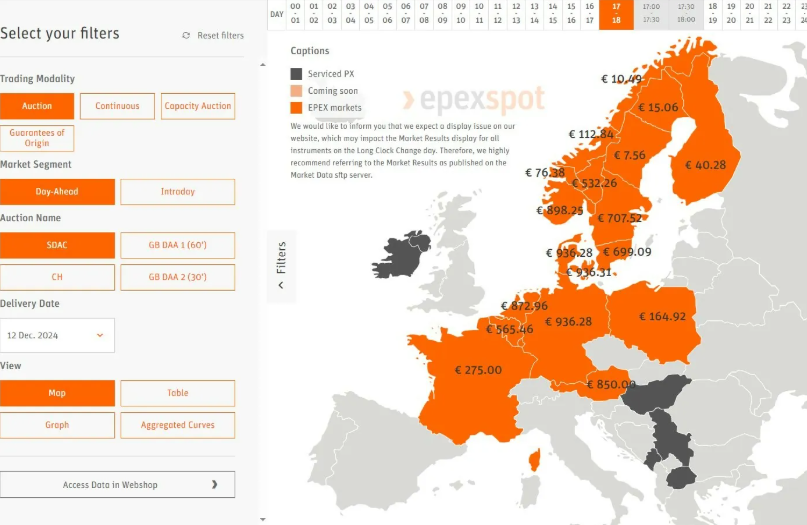When renewables fail, the price of electricity jumps to 1000 euros per megawatt hour. Yes, you read that right – and is this what the future holds for us? The President of the Slovenian Democratic Party (Slovenska demokratska stranka – SDS), Janez Janša, has also responded to this, saying that “the electricity profiteers, both domestic and foreign, are literally destroying energy security and prosperity”, and thus endangering national security.
In the short term, the role of the depletion of natural resources in the risk to energy security is largely irrelevant, but in the long term, it has an absolute impact on GDP, financial development, trade openness and technological development, as shown by the case of Germany, where the price of electricity has soared as alternative sources have failed.
Today, the electricity price in Germany between 5 p.m. and 6 p.m. is almost 1000 euros per MWh, because there is no sun and no wind. This is the figure published by the European Power Exchange (EPEXSPOT), which operates in Austria, Belgium, Denmark, Finland, France, Germany, Great Britain, Luxembourg, the Netherlands, Norway, Poland, Sweden and Switzerland. This is a worrying figure, because in Slovenia, the Golob government is literally forcing the use of alternative sources that are not reliable, with the consequence of higher costs, not to mention the destruction of the economy. In recent years, renewable sources such as solar and wind energy have often been presented as the solution to the global energy future. However, their limitations are increasingly becoming apparent, making nuclear energy crucial to ensuring a stable, reliable and clean energy supply.
According to the Clean Energy Wire, a government adviser has said that electricity prices are higher as a result of the exit, and most of the respondents in the poll say the nuclear exit was a mistake.
While German renewables advocates do not admit that electricity prices have risen since the closure of nuclear power plants, the data suggests otherwise. Energy expert Bolay of the business association DIHK also insisted that decommissioning the nuclear power plants must inevitably have had an impact on electricity prices. “It is clear that more supply on the market means lower prices for buyers,” he argued. The weakened output of the German economy so far may have masked the real effect: “We can expect bigger consequences when the economy gets back on track and energy demand picks up,” Bolay said. The DIHK pointed out that wholesale electricity prices in spring 2024 were still twice as high as in 2019, plus taxes, grid charges and other levies, writes Clean Energy Wire.
The empirical link between the depletion of natural resources and energy security risks was explored in a study which also concluded that the depletion of natural resources increases long-term energy security risks globally, which, in turn, threatens all segments of the country, which was also pointed out by Janez Janša, who wrote on X: “The electricity profiteers, domestic and foreign, are literally
destroying our energy security and prosperity. Their behaviour is a direct threat to national security. All this with the paid support of [the national media outlet] Radio-Television Slovenia and [the largest commercial television station] 24ur. A lot of work for law enforcement and an investigative commission of the National Assembly.”
Solar power is not reliable
The fact is that to achieve sustainable energy goals, we need a stable source of energy that is not dependent on weather conditions – and that is exactly what nuclear power can offer. Solar panels and wind farms have become a symbol of green energy, but their efficiency is not constant. Solar power plants only generate electricity about 20 percent of the time each year because their operation is limited by nights, cloud cover, winter months, and weather events such as dust or snow. Similar constraints apply to wind farms, which are dependent on wind conditions. To fill these gaps in energy production, reserves are needed, and they usually come in the form of fossil fuel power plants. Although there are plans to store energy in batteries, today’s technology is not capable of storing sufficient energy for long-term use, especially during periods of prolonged cloud cover or days without wind. Consequently, renewable energy sources cannot replace fossil fuels on their own.
The solution is nuclear power
Nuclear power offers a solution to many of the challenges of modern energy, according to American physicist Bill Budinger. He points to the example of France, which switched almost entirely to nuclear power plants after the 1973 oil crisis. Today, France uses nuclear power to meet more than 70 percent of its electricity needs, and has the lowest electricity prices in Europe. In addition, nuclear power is safe, as the French system has had no serious accidents. While many countries are still hesitant, others are already following France’s example. In China and Poland, large-scale construction of new nuclear reactors is underway, while more than 30 countries are considering the introduction of nuclear power as a key resource to meet energy and climate goals.
While the world is moving towards increasing nuclear generation, the USA is seeing a decline in this sector. Nuclear power plants, which were key to clean energy production, are being closed, and no replacements are planned. This decline is the result of historical fears of nuclear power that have limited its development. Nevertheless, statistics show that nuclear power is among the safest and most efficient energy solutions. We are facing climate change and an increase in energy demand, which requires systemic changes in our energy policy. Nuclear power is one of the few technologies that can provide reliable, clean and large-scale electricity generation 24 hours a day, every day of the week.
A.H.


